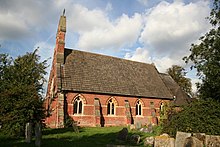William Knight (architect)
Appearance



William Knight (1840 - 21 November 1923) was an English architect based in Nottingham.
Career
He was born in Sneinton, Nottingham, the son of William Knight (1808-1897), timber merchant, and Mary Ann (b. 1817).
He had offices at 28 Derby Road, and in 1882 moved to East Circus Street, Nottingham.[1]
He married Elizabeth Lindsay Symington (1842-1894), 3rd daughter of James Symington, on 3 April 1872[2] in St Helen's Church, Oxendon, Leicestershire and they had the following children:
- William P. Knight (b. 1873)
- Harold Knight (1874-1961)
- Ethel Lindsay Knight (1875-1941)
- Agnes Mary Knight (1877-1950)
- Edgar Knight (b. 1881)
He retired to Great Bowden, Leicestershire, where he died on 21 November 1923.
Notable works
- St Michael's Church, Hoveringham 1865 (rebuilding)[3]
- St Andrew's Church, Nottingham 1870-71[4]
- Vicarage to St Andrew’s Church, Chestnut Grove, Nottingham 1871[5]
- National Schools, Carlton Road, Nottingham 1872[6]
- Christ Church, Bexley Heath 1872-77[7]
- No. 3, Plumptre Place, Lace Market, Nottingham 1879[8]
- Nether Broughton Church, 1882 (restoration of the tower)[9]
- Church of St John the Divine, Bulwell 1884-85[10]
- Fairlawn, Leicester Road, Market Harborough (for Captain Robert Symington) ca. 1880s.[11]
References
- ^ "Legal and Public Notices". Nottingham Journal. England. 9 November 1882. Retrieved 27 January 2019 – via British Newspaper Archive.
- ^ "Marriages". Leicester Chronicle. England. 6 April 1872. Retrieved 27 January 2019 – via British Newspaper Archive.
- ^ Historic England. "Church of St Michael (1370181)". National Heritage List for England. Retrieved 27 January 2019.
- ^ Historic England. "Church of St Andrew and Boundary Wall (1058983)". National Heritage List for England. Retrieved 27 January 2019.
- ^ Historic England. "Vicarage to the Church of St Andrew (1246777)". National Heritage List for England. Retrieved 27 January 2019.
- ^ "The large new National Schools…". Nottingham Journal. England. 18 January 1872. Retrieved 27 January 2019 – via British Newspaper Archive.
- ^ Historic England. "Christ Church Parish Church (1359404)". National Heritage List for England. Retrieved 27 January 2019.
- ^ Harwood, Elain (2008). Pevsner Architectural Guides. Nottingham. Yale University Press. p. 103. ISBN 9780300126662.
- ^ "Nether Broughton". Grantham Journal. England. 23 December 1882. Retrieved 27 January 2019 – via British Newspaper Archive.
- ^ Historic England. "Church of St John the Divine (1270623)". National Heritage List for England. Retrieved 27 January 2019.
- ^ Lee, J M; McKinley, R A (1964). A History of the County of Leicestershire. Vol. 5. British History Online. p. 133-153.
